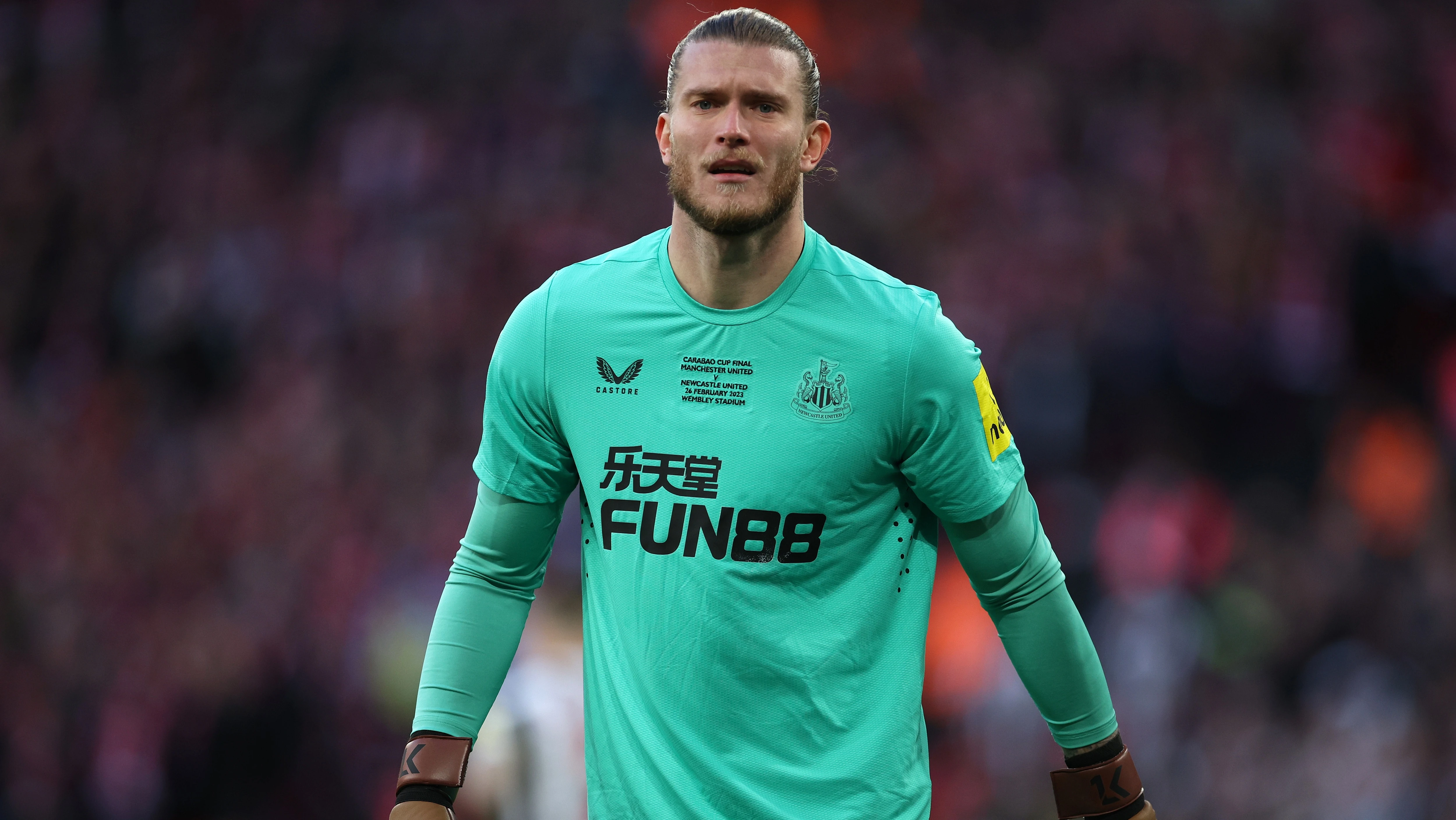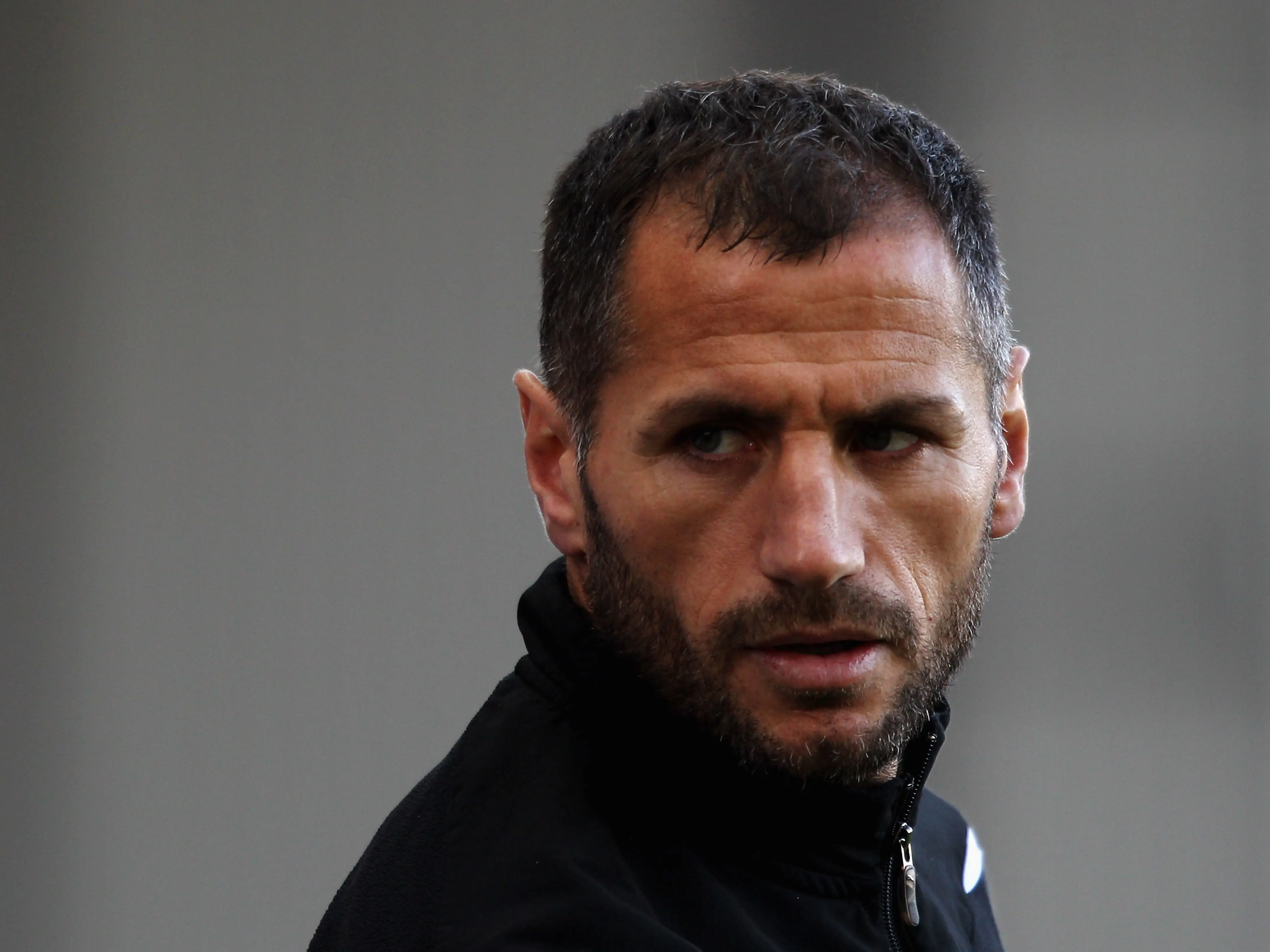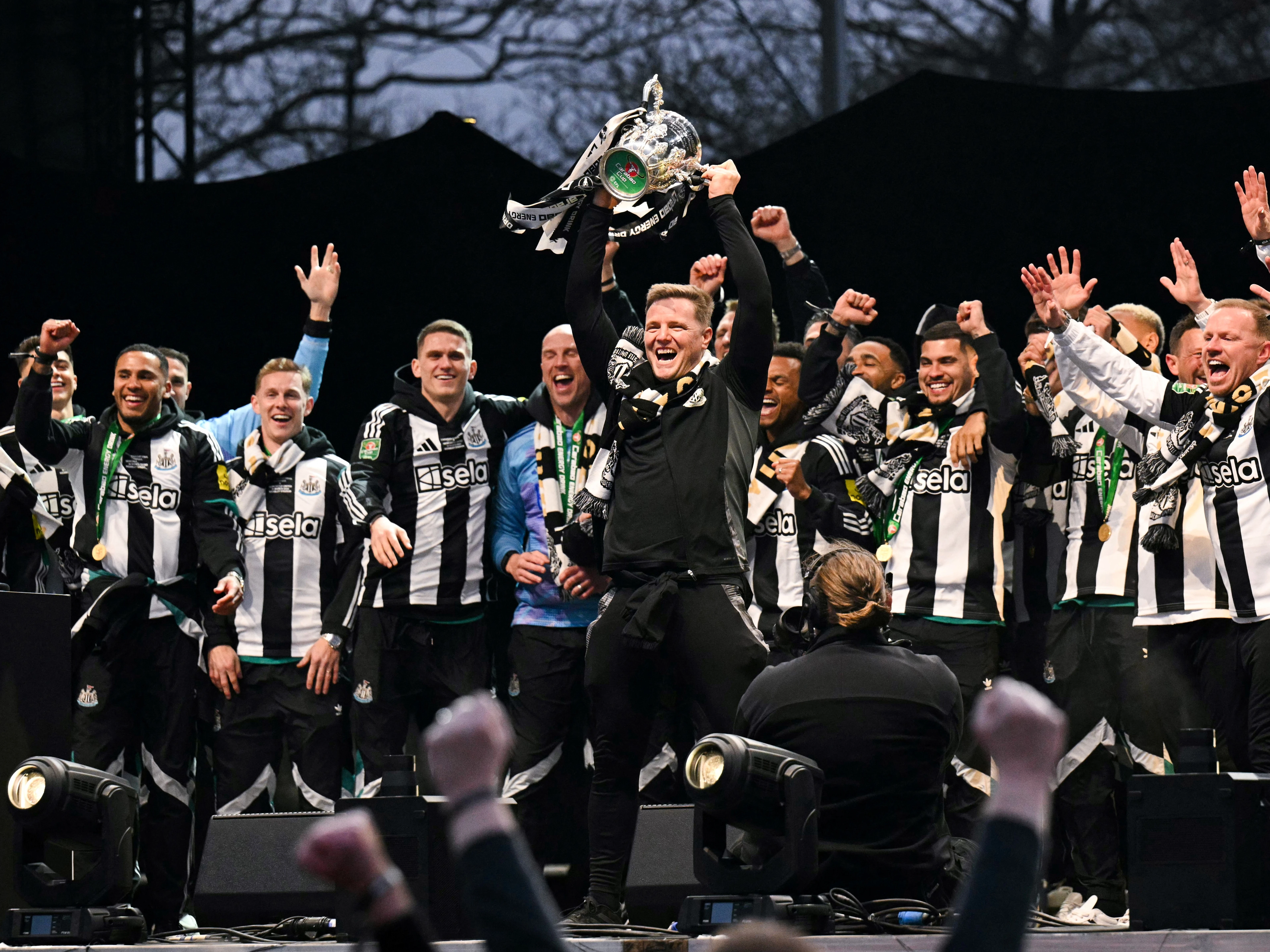"To make a debut for a club in the final, that's obviously a bit unique. In my case, I'm lucky that I've already experienced a lot of games, big games, so it wasn't completely new for me. But at the same time, of course, it's a new situation, and you can't rely on the past."
It is fair for the German, who turns 30 in June, to reiterate his credentials. At times over the past month Karius has been depicted as a bit of an unknown quantity when in reality the past he alludes to contains that sizeable haul of first team appearances, spread across three of Europe's top leagues and the continent's two flagship club competitions.
But Karius, a laid-back character without being withdrawn, will know why his fortunes hold a curiosity for English football fans. Before his Newcastle debut in the Carabao Cup final at Wembley, The Athletic published letters to the squad from members of their families and friends. Karius' came from his partner, Diletta, who wrote about the "two interminable, painful and incredible years" between an outing for Union Berlin and his next competitive one at Wembley a fortnight ago, of having his dream "brutally ripped" away from him and of the "sad nights, the knot in your throat and the bad thoughts that kept you away from playing".
She also wrote of pride at her boyfriend's strength and courage, of his conviction and "about the long journey you've been on, your rebirth". She used a mantra that has guided him: "as you taught me, life is ten per cent what happens to you and 90 per cent how you decide to react". It is reasonable to assume the latter part of Karius' career has required him to respond in some way.
"I had a lot of setbacks in the last years, where before it was just always going uphill for me," he explains, taking a seat in the Magpies' newly-refurbished training centre restaurant. "So when you find yourself in new situations, where things are not going according to plan, at the beginning it's difficult to deal with this. But then you have to adapt and make the best out of it, and not put your head in the sand or give up. I think that's a good quote, really.
"It's nice to have someone that understands your situation and can feel it with you. Some people, some partners, would not understand – they don't really get it, or don't get what kind of situations and phases we have to go through, me and also other football players. It's not just always fun and joy. It's good to have a partner like this that understands, who can feel with you and support you. That gives me a very good feeling – it would give anyone, I think, a good feeling."
The letter hinted at a depth from which Karius cannot have found it easy to rebuild. Has he learned how to react in adversity over the years? "Well, now I'm playing my tenth or 11th year as a professional. I'm turning 30 so I'm not relaxed, but I have a different approach on some things than when I was younger, maybe. I can see things more clear and don't react or get too emotional or things like this. Even when things don't go your way I can stay calm and stay focused, concentrate.
"Maybe when I was younger it was not that easy. I took everything to heart and took it personally. But now I think I'm approaching things better, handling things better, and that helps me to keep positive, keep working and doing my best. The last few years, I've probably put more effort into me, myself, my body than all my first years when I was playing and everything was going perfect. I was probably way lazier then."
We are skirting round it, circling it a little, but there is no real need to directly revisit the first final of Karius' career. It cast the kind of shadow from which you get the impression he is only just emerging. He has endured rather than enjoyed elements of his time in the game since his final game for Liverpool in Kyiv five years ago. There were largely unproductive loan spells with Besiktas and Union Berlin and, from February 2021 until a fortnight ago, nothing. He didn't play a single meaningful minute for two years and was training alone with a coach when Newcastle called last September. He recalls the waiting and the uncertainty but the calm too. He used his free time to think, to explore.
"I did some yoga, meditating, all these kinds of stuff. I just tried to experience some new things that I didn't have time for before," he says. "It was obviously a shame not to be with a team straight away and be in that competitive flow every day and play pre-season games, but I made the best of it really and stayed calm."
How did he find it? "It's good, because yoga helps you be really flexible, and is a good balance for if you do power or weight sessions. And also meditating is good because it helps you to stay calm and focus at the same time. It's interesting to work with coaches from different areas and their approaches. It's not bad, you know? I wouldn’t say I'm completely crazy on both but I'm definitely open to exploring things like this and trying myself out."
He retains an interest in fashion too and makes a fair point about how high profile footballers' external interests don't always seem to play well with the public. "For some people that are not really into it, they see it as a distraction and things like this, which I don't necessarily think is true. But in my case, I used this two or three months to work on my body and my sport and everything, and put my hobbies and the rest of it to the side."
It is daft when you think about it though; the idea that occupying your mind with something that isn’t football is detrimental to the day job. The sport is consuming enough. Surely you have to keep these interests alive? "Yeah, I think it's important. As long as it doesn't affect your job, your performance, that you can do what you want to do," he nods. "If you have another passion aside of playing football that's just there as a hobby and a passion, then go after it and do it. Some people are into fashion and exploring themselves there. Some people might like learning languages, and speak eight languages, I don't know – there are so many different ways. But I think there's nothing wrong with someone just having another passion as long as it's not affecting your job and you're fully focused and performing. This should not be an issue."
Karius points out that he hasn't felt any such pressure at Newcastle. "I feel like here, everyone can really be how they want to be. I think that's why also we have this strong group, this strong bond between each other, that's not really people trying to form someone into something you're not.” So what are you then? "I'm not the loudest in the changing room. I'm relaxed and quiet. But on the pitch I need to be a leader as a goalkeeper from behind. But apart from this, I'm a quiet, easy guy really. I don't need any extras or special attention. Like I said, I like to explore myself out of football and try things out, but when I'm here I'm just really enjoying my time."
As a child, Karius tried motocross, encouraged by his father Harald, but concluded that football was more his thing. "My mum was happy because it's less dangerous," he smiles. A forward at first, by the time he left Stuttgart as a teenager to join Manchester City – where he played alongside Kieran Trippier – he was a highly-regarded young stopper. The striking instinct remains. "I still enjoy scoring goals sometimes in training," he adds, "if we have a goalkeeping drill where we need someone shooting. I think everyone likes to score a goal now and then."
When Nick Pope was dismissed at St. James' Park last month, and knowing the quirks of circumstance concerning United's other goalkeepers, he knew he was in for a week of intense scrutiny. "Things changed for me in the Liverpool game, even though I wasn't part of that game. I just tried to prepare myself as best I could for the match, have a good week in training and get a good feeling with the defence, just so I'm prepared to go into the game with a good feeling.
"I wasn't really stressed or anything – I actually had a feeling that we would win the game, to be honest. I just tried to soak everything in, enjoy every moment. Unfortunately we lost but it was great to be part of a game like this and be back on the field. Some people never play a final. I already played my second one now. I think once you play in games like this you want to go back because it's really special occasion and you can feel that on the build-up. On the day of the game in the stadium, everything really is a bit different compared to normal games."
In conversation he is unflappable. How do you prepare in those circumstances? His answer is simple and makes the question feel a bit thoughtless. You just train, he deadpans, and try "not to overthink so much. In a game a million things can happen – you can go in front, you can concede a goal, you can make a mistake, you can save a penalty. There are so many possibilities. If you think about everything, you will go crazy.
"Of course there's a bit of tension, but at the same time you need to stay relaxed and enjoy the moment, and just trust in your abilities that you know you have and then play, like I did, a solid game – give your defence a good feeling that they can rely on you, and just give that safety and security to the rest of the team. I think that's important as a goalkeeper because if the team thinks we have someone in the back that is nervous or shaky, it's not healthy for the rest of the group."
Goalkeeping is an odd business at the best of times and much of it is based on "feeling", he says. Karius felt he did "what he could" to repel Manchester United at Wembley and like most of a black and white persuasion, he rues the deflection on Marcus Rashford's shot for the second goal. "I didn't really have any shaky moments or anything. I felt solid.
"It's good to remind people I'm here, and I've still got a lot to offer. I'm not surprised I know that about myself, but people sometimes forget or have a wrong picture of you. For that reason, I think it was good. But I'm not surprised because I'm working every day, hard, which people don't see. It pays off eventually because football gives you a chance, an opportunity. Sometimes it takes a bit longer, sometimes it's always up and down. I was sure eventually I would get my chance."
The "wrong picture", he reckons, comes from him being out of sight and mind for a long period. "And of course if you don't play, it's never a nice situation for me. You train every day to play and then if you don't play on the weekend, you miss that feeling a little bit."
Karius doesn't know what the immediate future holds for him. With this cyclical life in the game comes a kind of numbness to the idea of moving on. It happens a lot and he has had to learn to do that before. What comes next may be unclear but until then, he is going to enjoy himself.
"I'm here until the summer. I don't know if I'll stay longer or not. We haven't spoken about this – there was no need for it," he says. "There is so much going on here at the moment – we have important games, it's a full schedule. There's no rush. In football you can never plan too far ahead.
"But I'm just enjoying my time here really. Whatever role I have to play until the end of the season, I'm doing it for the team to be successful, and then we will see. Everything is possible. But for sure, my aim for me personally is to get more gametime again in the future because I know I can perform and play on this level."




